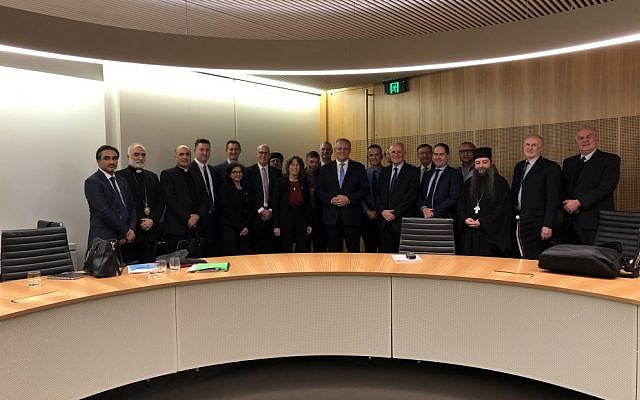Religious freedoms vs religious discrimination
'We live in an age that increasingly affirms equality of rights as a moral imperative'.
FOLLOWING last year’s Religious Freedom Review conducted by an expert panel headed by Philip Ruddock, and the publication of its report, the Australian government announced its intention to introduce a new law, a Religious Discrimination Act, to prohibit discrimination on the basis of religious belief or affiliation.
According to the government, the legislation will say that you are not allowed to discriminate against another person on the basis of that person’s religious beliefs or affiliation, but it will then provide a series of exceptions which will permit faith-based organisations to exclude a person of another faith, or no faith, from membership or employment or other aspects of their operations.
This would be similar to the structure of all previous federal and state laws. The basic scheme of these laws is that they prohibit discrimination (e.g. on the basis of race, sex, disability or age), but then have exceptions or exemptions for faith-based organisations, among others.
Religious freedom currently receives some constitutional protection in Australia under section 116 of the Australian Constitution, but the High Court has given that section a narrow interpretation. Section 116 does not explicitly create a personal or individual right to religious freedom.
The exceptions for faith-based bodies in our current anti-discrimination laws are the principal legal protections for religious freedoms that presently exist in Australia.
Religious freedom as a positive right rather than a narrow exception
In Australia’s political and cultural environment to date, in which religious freedoms have not been under serious challenge, this exceptions-based model has provided adequate legal protection to religious freedoms in Australia.
However, there is evidence that social and ethical norms throughout the western world are changing, and the ambit of religious freedoms for faith-based organisations is increasingly being questioned, if not challenged openly.
Accordingly, many faith community leaders argue that the Australian government needs to adopt a different approach, one that affirms as a positive right, rather than a negative “exception to the rule”, the proposition that faith-based organisations are free to operate according to their religious principles and ethos.
Such an approach would also be more in keeping with Australia’s obligations under various international instruments, which provide that everyone “has the right to freedom of thought, conscience and religion”, including the freedom “to have or to adopt a religion or belief of his choice, and freedom, either individually or in community with others and in public or private, to manifest his religion or belief in worship, observance, practice and teaching”.
These freedoms are said to be so fundamental that they must not be derogated from, even in times of public emergency.
PM’s meeting with faith community representatives
Representatives of a number of faith communities have expressed the hope that the legislation will state clearly that, except in limited, clearly defined circumstances, religious institutions which act in accordance with their ethos will be deemed not to be engaging in unlawful discrimination, even if the effect of doing so excludes a range of other people – without singling out any one specific group or specific groups – from participating in their activities or using their facilities.
This was a key message conveyed to the Prime Minister when he met with representatives of the Jewish, Catholic, Anglican, Uniting Church, Hindu, Muslim, Buddhist, Greek Orthodox, Coptic, Assyrian and Melkite communities, among others, in Sydney last week.
We pointed out that religious practices which discriminate in favour of members of the same faith community, or in favour of a gender, may not fit the classic form of negative discrimination, which seeks to exclude and disadvantage others out of prejudice.
Examples
For example, in synagogues and other institutions which adhere to Orthodox Jewish tradition, certain roles, such as rabbis and cantors, and certain functions, such as acting as a judge of a Beth Din (Jewish religious court), the solemnisation of religious marriages, the performance of a religious circumcision, the religious slaughter of animals and the burial of the dead, are required by halachah (Jewish religious law) to be carried out by religiously observant males. The Conservative and Progressive streams of Judaism also apply some of these rules, or apply them less stringently.
Some Jewish schools professing an Orthodox Jewish ethos will only enrol students who are halachically Jewish. Others may also separate their male and female students for some of their classes.
Indirectly, if not directly, these practices discriminate on the basis of religious belief and gender. It will need to be a priority that the charitable status and eligibility for government funding of faith-based institutions and charities are not jeopardised on this account. At present, these practices are permitted by the exceptions contained in anti-discrimination legislation. However, we live in an age that increasingly affirms equality of rights as a moral imperative. Many would see these mere exceptions as a slender thread upon which to hang a fundamental freedom.
Another priority for Orthodox Jewish schools is their freedom to set and enforce conditions for employees and contractors, which prohibit behaviour that conflicts with the school’s ethos.
Finally, while religious institutions are, and should remain, free to promulgate the tenets of their faith, including beliefs about marriage and sexuality, that freedom ought not to extend to vilification of entire groups on the basis of race, colour, sex, sexual orientation or other arbitrary factors. Differences in values and beliefs can be acknowledged and explained without compromising the imperative to respect at all times the dignity and humanity of those with whom such differences are held.
Government “not rushing this”
From even this brief survey it should be clear that the issues the government is grappling with will require some balancing of competing rights and freedoms. The Prime Minister’s assurance that the government is “not rushing this”, and will allow ample time for wide consultation, is welcome.
Peter Wertheim is co-CEO of the Executive Council of Australian Jewry.


comments